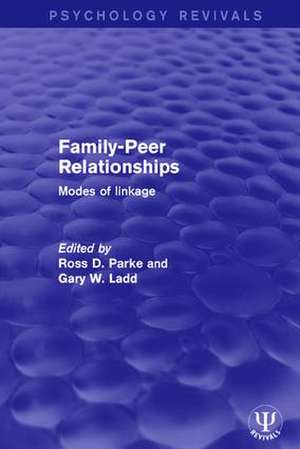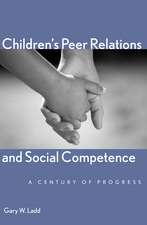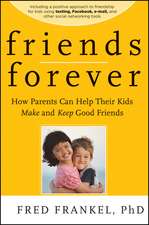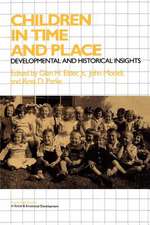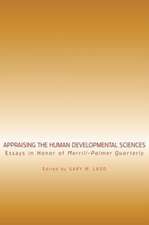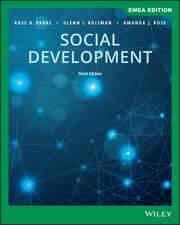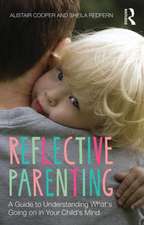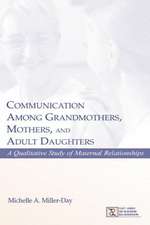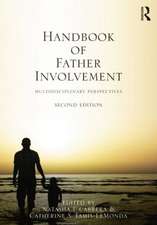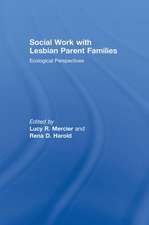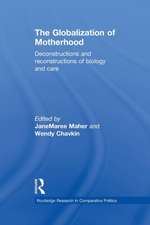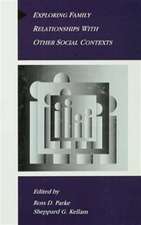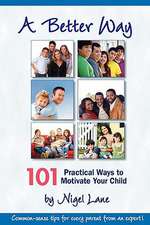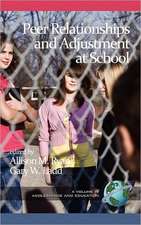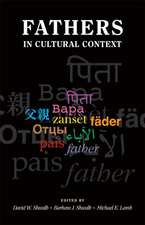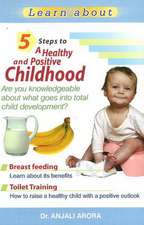Family-Peer Relationships: Modes of Linkage: Psychology Revivals
Editat de Ross D. Parke, Gary W. Ladden Limba Engleză Paperback – 15 noi 2017
| Toate formatele și edițiile | Preț | Express |
|---|---|---|
| Paperback (1) | 356.44 lei 6-8 săpt. | |
| Taylor & Francis – 15 noi 2017 | 356.44 lei 6-8 săpt. | |
| Hardback (1) | 1285.17 lei 6-8 săpt. | |
| Taylor & Francis – 8 feb 2016 | 1285.17 lei 6-8 săpt. |
Din seria Psychology Revivals
- 9%
 Preț: 800.46 lei
Preț: 800.46 lei - 9%
 Preț: 940.09 lei
Preț: 940.09 lei -
 Preț: 326.49 lei
Preț: 326.49 lei - 18%
 Preț: 661.73 lei
Preț: 661.73 lei -
 Preț: 246.17 lei
Preț: 246.17 lei - 9%
 Preț: 835.00 lei
Preț: 835.00 lei -
 Preț: 258.67 lei
Preț: 258.67 lei - 5%
 Preț: 218.55 lei
Preț: 218.55 lei - 9%
 Preț: 1460.68 lei
Preț: 1460.68 lei -
 Preț: 245.88 lei
Preț: 245.88 lei -
 Preț: 338.40 lei
Preț: 338.40 lei - 5%
 Preț: 265.78 lei
Preț: 265.78 lei -
 Preț: 341.57 lei
Preț: 341.57 lei -
 Preț: 401.26 lei
Preț: 401.26 lei - 25%
 Preț: 992.63 lei
Preț: 992.63 lei - 44%
 Preț: 724.77 lei
Preț: 724.77 lei - 17%
 Preț: 290.61 lei
Preț: 290.61 lei - 28%
 Preț: 989.34 lei
Preț: 989.34 lei - 25%
 Preț: 552.60 lei
Preț: 552.60 lei - 26%
 Preț: 820.71 lei
Preț: 820.71 lei - 26%
 Preț: 846.09 lei
Preț: 846.09 lei - 18%
 Preț: 1053.33 lei
Preț: 1053.33 lei - 18%
 Preț: 1061.19 lei
Preț: 1061.19 lei - 25%
 Preț: 964.75 lei
Preț: 964.75 lei - 18%
 Preț: 1164.12 lei
Preț: 1164.12 lei - 28%
 Preț: 850.59 lei
Preț: 850.59 lei - 26%
 Preț: 847.73 lei
Preț: 847.73 lei - 26%
 Preț: 594.33 lei
Preț: 594.33 lei - 28%
 Preț: 825.21 lei
Preț: 825.21 lei - 25%
 Preț: 1049.90 lei
Preț: 1049.90 lei - 26%
 Preț: 1046.65 lei
Preț: 1046.65 lei - 18%
 Preț: 906.17 lei
Preț: 906.17 lei - 28%
 Preț: 848.15 lei
Preț: 848.15 lei - 5%
 Preț: 1423.10 lei
Preț: 1423.10 lei - 28%
 Preț: 819.48 lei
Preț: 819.48 lei - 18%
 Preț: 1055.21 lei
Preț: 1055.21 lei - 18%
 Preț: 1284.97 lei
Preț: 1284.97 lei - 26%
 Preț: 819.48 lei
Preț: 819.48 lei - 29%
 Preț: 1299.62 lei
Preț: 1299.62 lei - 27%
 Preț: 1022.07 lei
Preț: 1022.07 lei - 26%
 Preț: 847.73 lei
Preț: 847.73 lei - 25%
 Preț: 964.32 lei
Preț: 964.32 lei - 26%
 Preț: 819.90 lei
Preț: 819.90 lei - 21%
 Preț: 906.17 lei
Preț: 906.17 lei - 28%
 Preț: 849.84 lei
Preț: 849.84 lei - 5%
 Preț: 1413.77 lei
Preț: 1413.77 lei - 29%
 Preț: 622.59 lei
Preț: 622.59 lei - 18%
 Preț: 1062.55 lei
Preț: 1062.55 lei - 18%
 Preț: 1063.44 lei
Preț: 1063.44 lei - 18%
 Preț: 876.27 lei
Preț: 876.27 lei
Preț: 356.44 lei
Nou
Puncte Express: 535
Preț estimativ în valută:
68.21€ • 70.95$ • 56.31£
68.21€ • 70.95$ • 56.31£
Carte tipărită la comandă
Livrare economică 12-26 aprilie
Preluare comenzi: 021 569.72.76
Specificații
ISBN-13: 9781138649262
ISBN-10: 1138649260
Pagini: 472
Dimensiuni: 156 x 234 x 24 mm
Greutate: 0.45 kg
Ediția:1
Editura: Taylor & Francis
Colecția Routledge
Seria Psychology Revivals
Locul publicării:Oxford, United Kingdom
ISBN-10: 1138649260
Pagini: 472
Dimensiuni: 156 x 234 x 24 mm
Greutate: 0.45 kg
Ediția:1
Editura: Taylor & Francis
Colecția Routledge
Seria Psychology Revivals
Locul publicării:Oxford, United Kingdom
Public țintă
Postgraduate, Professional, and UndergraduateCuprins
Acknowledgments Part 1: Introduction and Overview 1. Themes and Theories: Perspectives on Processes in Family–Peer Relationships Gary W. Ladd 2. Family and Peer Relationships in Historical Perspective Peter D. Renshaw and Ross D. Parke Part 2: Indirect Influences: Family Relations, Interactions, and Environments 3. Predicting Peer Competence and Peer Relationships in Childhood from Early Parent–Child Relationships James Elicker, Michelle Englund, and L. Alan Sroufe 4. Familial Contribution to Peer Competence Among Young Children: The Role of Interactive and Affective Processes Ross D. Parke, Jude Cassidy, Virginia M. Burks, James L. Carson, and Lisa Boyum 5.Links Between Adolescents’ Relationships with their Parents and Peers: Models, Evidence, and Mechanisms Catherine R. Cooper and Robert G. Cooper, Jr. 6. Beyond Parent–Child Relationships: Potential Links Between Family Environments and Peer Relations Brenda K. Bryant and Kristine A. DeMorris 7. Societal Influences on Children’s Peer Relationships Moncrieff Cochran and Virginia Davila Part 3: Direct Influences 8. Parents’ Management of Children’s Peer Relations: Facilitating and Supervising Children’s Activities in the Peer Culture Gary W. Ladd, Susan Muth Profilet, and Craig H. Hart 9. Parents’ Regulation of Children’s Peer Interactions: Direct Influences Susan P. Lollis, Hildy S. Ross, and Ellen Tate Part 4: Variations on Family–Peer Relationships 10. Cross-Cultural Perspectives on Family–Peer Relations Carolyn Pope Edwards 11. Peer Relations in Children with a Depressed Caregiver Carolyn Zahn-Waxler, Susanne Denham, RonaldJ. Iannotti, and Mark Cummings 12. An Organizational Perspective on Peer Relations in Maltreated Children Dante Cicchetti, Michael Lynch, Susan Shonk, and Jody Todd Manly 13. Family Economic Circumstances, Life Transitions, and Children’s Peer Relations Charlotte J. Patterson, Pamela C. Griesler, Nancy A. Vaden, and Janis B. Kupersmidt 14. Epilogue: Remaining Issues and Future Trends in the Study of Family–Peer Relationships Ross D. Parke. Author Index. Subject Index.
Descriere
Originally published in 1992, this volume provided an up-to-date overview of recent research concerning the links between family and peer systems. Considerable work in the past had focused on family issues or peer relationships, but these systems had typically been considered separately. This volume bridges the gap across these two important socialization contexts.
